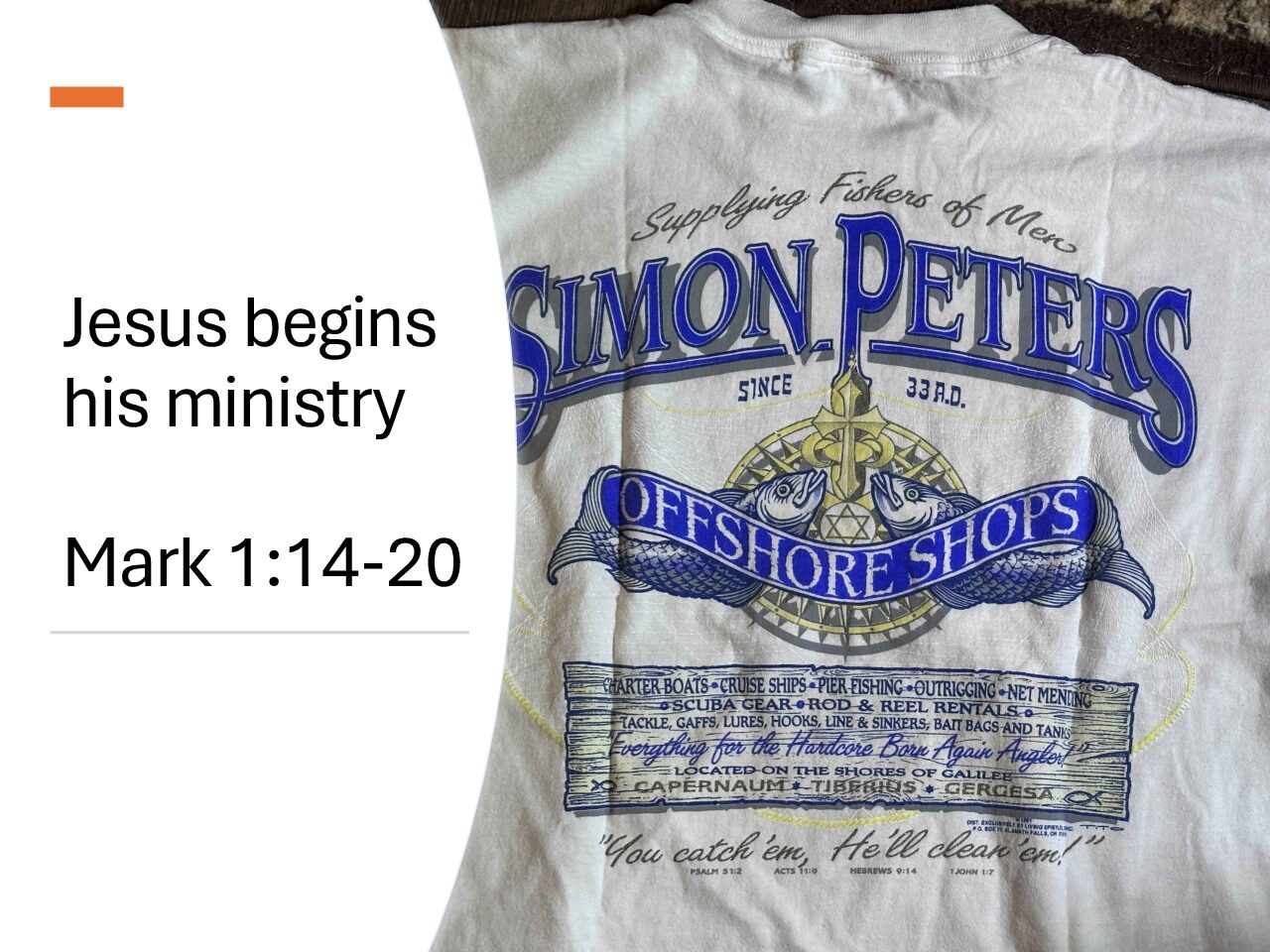Jeff Garrison
Mayberry & Bluemont Churches
January 14, 2024
Mark 1:14-20
At the beginning of worship:
In her book, God is No Fool, Lois Cheney shares this bit of dialogue:
“Moses said, ‘Oh, Come on now! Be sensible! Not me! I’m a terrible speaker. They’ll never listen.’ And God said: ‘Oh, for crying out loud! Use your brother to help with speaking.’ And Moses led God’s people out of slavery.
And Jonah said, ‘Oh, Come on now! Be sensible! Not me! I’m not the type.’ And after a rather unexpected vacation in a fish, just thinking things over, he talked the people of Nineveh into repentance.
And Zacharias said, ‘Oh, Come on now! Be sensible! Not me! My wife and I are too old to have kids.’ And God said: ‘Oh shut up! He did shut up—for nine months. And John was born, and the way of Christ was opened.
And I heard a child say: ‘I can’t serve God, I’m too young.’
A senior citizen said: ‘I can’t serve God, I’m too old.
And I heard a boy say: ‘I can’t serve God, I’m not good enough.’
And I heard a woman say: ‘I can’t serve God, I’m not skilled enough.’”[1]
What excuses do we give God? This is a good question for us to ponder as we explore the beginning of Jesus’ ministry as he calls disciples.
Before reading the Scripture:
Last week we began exploring the gospel of Mark, looking into the opening verses of the chapter. As I indicated then, Mark doesn’t make a big deal about John the Baptist. Mark’s subject is Jesus Christ and the good news he brings to earth.
Today, we’ll pick up where we left off. As in verse 1, verse 14 reiterates Jesus’ purpose announced in verse 1, “To proclaim the good news of God.” Following this, Jesus summarizes his message, followed by the calling of the first four disciples.
Read Mark 1:14-20
When asked what miracle Jesus first performed, most will say it was the turning the water into wine at the wedding in Cana of Galilee.[2]
But I think there’s another overlooked miracle. Jesus calling the fishermen. How many true fishermen and fisherwomen do you know, who’d leave their tackle behind to follow some stranger on the beach?
But let’s be a bit more serious as we look at today’s text. Mark places the beginning of Jesus’ ministry after John’s arrest. The first two verses of our text sets things in context. Verse 14 serves as a press conference, announcing Jesus’ entry on the scene. The spotlight focuses on Jesus, not John. While most translations say John was arrested or placed into prison,[3] the Greek word used by Mark translates directly as “handed over.”
This is a kay word for Mark, for later the gospel author will use that same word for Jesus being handed over to the Romans and for the fate of Jesus’ followers who suffer persecution.[4]
Mark’s point is that John has done his work; it’s now time for the focus to be on Jesus. However, the language used by Mark foreshadows what will happen to Jesus and perhaps us. Danger lurks when the gospel is proclaimed.
Next, Mark summaries Jesus’ ministry. Jesus proclaims the good news of God. I spent a lot of time last week discussing the meaning of the gospel or good news.[5] Now, I want to point out something often overlooked. We tend to think of the good news from our own vantage point. We privatize the gospel, so we understand it personally. And while that’s important, here Mark indicates the good news is “of God.” It’s not just for me. God works through Jesus to restore the world to himself and in our text this morning, we see Jesus setting the stage for this work.
The following sentence from Jesus summaries his gospel.[6] “The time is fulfilled, and the kingdom of God has come near; repent and believe in the good news.”
I could probably do a whole sermon on this one sentence. There’s much here to unpack here. I’ll break it down quickly, starting with the first phrase, “The time is fulfilled.” The Greeks had two words for time. The one we are more familiar with is chronos. This is time understood with clocks and calendars. From this word, we get chromometer, which is an excellent timepiece that was necessary, pre-GPS, for navigation. If it was this word, it would mean, “The clock has run out.”
But instead, the other word Greeks used for time is karios. This word implies it’s the right time for something to happen. Looking back to the prophets whom the Jews had placed their hope, we see that it is the time for the fulfillment of their hope. We move from “anticipation to actualization.”[7]
This is not the end of history, but an ongoing beginning of a new history.
Next, we are given what I think is a riddle. “The kingdom of God has come near.” God’s kingdom here implies the “rule of God,” instead of a particular territory. The Jewish hope that God would assert his authority and put an end to human rebellion has begun.[8] The term, “come near” is in the perfect tense, implying that the action began in the past carries on in the present.[9] It’s still ongoing, in the life of the church.
Jesus ends his summary of the gospel with a command: Repent and Believe. Both verbs are imperative. They’re important. Repent implies to turn around. We’re to turn away from sin. Believe is what we are to turn toward or to.[10] We turn toward and trust God’s good news.
Now that the spotlight is on Jesus and his teachings, he sets out to recruit assistants by calling a group of fishermen. Here we see an example of those who live out Jesus’ command. Like with repentance, they turn their backs on their previous life and turn to the one who has the good news.
This is a miracle. They hang up their nets and leave behind their family and coworkers to follow Jesus. Jesus demands obedience. We are not privy to why they were so willing to follow Jesus. For all we know, they haven’t even heard him preach. Maybe, as was suggested in this week’s men’s Bible Study, the blues weren’t running.
But we know this. Their decision to follow Jesus helped change the world. These four would become key leaders, not just among the disciples, but in the early church. We see them take off after Jesus without hesitation, unlike Moses, Jonah, and Zacharias. However, we know later they will have doubts.
In my last year of seminary, I worked halftime at Community Presbyterian Church of Ben Avon, a community on the northside, west of Pittsburgh. The pastor, Brent Dugan, started out as a mentor of mine and over time, we became close friends. Sadly, he died in 2006, which is why I still have this shirt that’s over 25 years old. It’s probably the oldest t-shirt I own. When I was in Utah, Brent came out several times to ski and on one of the trips, sometime back in the 90s, he presented me with this shirt. On the back it reads:
Simon Peters Offshore Shop
Supplying Fishers of Men since 33 AD
Charter Boats * Cruise Ships * Pier Fishing * Outrigging
Net Mending * Scuba Gear *Rod and Reel Rentals
Tackle, Gaffs, Lures, Hook, Line, & Sinkers, Bait Bags and Tanks
“EVERYTHING FOR THE HARDCORE BORN AGAIN ANGLER!”
Located on the Shores of Galilee.
I really like the phrase at the bottom of the shirt. You’ll have to look close to see:
“You catch ‘em, He’ll clean ‘em!”
I think I know why these guys were so willing to follow Jesus. “You catch ‘em, He’ll clean ‘em!”
As everyone knowns, it’s fun to catch fish, cleaning them is at best mundane! Jesus calls us to go out and cast the net, to go out and proclaim the gospel in the hope we’ll lure in with the gospel message those in need of love and forgiveness. We’re fishing for Jesus. He is the only one who can forgive those who repent. He’s the only one who can cleanse one contaminated with sin.
Like the disciples, we follow Jesus. He does the heavy and dirty work, cleansing us and others. We follow Jesus and are to be faithful, for we have hope in the kingdom that has come near and will one day be experienced in the fullness. Amen.
[1] From K. R. Conover in the bulletin board, “Bottom Drawer (#3065), January 24, 1997. From Lois A. Cheney, God is No Fool. The words have been slightly altered. I used this clip in a sermon preached in Cedar City, Utah on January 26, 1997.
[2] This is certainly the first miracle recorded in John’s gospel. See John 2:1-12.
[3] The NRSV, Revised Standard Version and Living Bible translate as “arrested.” The King James Bible and NIV translate as “put in prison.”
[4] James R. Edwards, The Gospel According to Mark (Grand Rapids, MI: Eerdmans, 2002), 41. This word (paradidomi) is used by Jesus to refer what is to happen in Mark 9:31 and 10:33. It is used 8 times in Mark 14 and 15 to describe what happens to Jesus. I tis also used in Mark 13 three times to refer to what may happen to believers in Mark 13.
[5] See https://fromarockyhillside.com/2024/01/07/marks-prologue-preparing-for-jesus-ministry/
[6] While this is often seen as a summary of the gospel, at least one scholar notes that while it is true for the historical Jesus, it is less true for Mark (this is the only time Jesus speaks like this). See Douglas R. A. Hare, Westminster Bible Companion: Mark (Louisville, KY: Westminster/John Knox Press, 1996), 20.
[7] Hare, 20-21.
[8] Morna D. Hooker, The Gospel According to Saint Mark (1991, Hendrickson Publishing, 1977 ), 55.
[9] The New Interpreter’s Study Bible, NRSV with the Apocrypha (Nashville: Abingdon, 2003), 1806, note on 1:15.
[10] Edwards 47.



Nice shirt. I hope you have a good week.
Thanks, I can’t believe I have kept a t-shirt nearly 30 years.
I use to have that exact shirt! I’d forgotten about it.
That’s neat. I haven’t worn it in a long time, but because it was a gift from someone no longer with us, I haven’t parted with it. I will do a blog post about Brent at some point. I did write an article that was in the Presbyterian Outlook in 2007 about him.
I have to admit, that’s a fantastic T-shirt.
Thanks, there’s a lot to ponder on it.